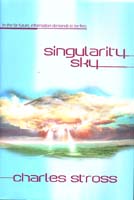 Singularity
Sky
Singularity
Sky
by Charles Stross
A book review by Mark L. Olson
Ace 2003, $23.95, 313 pp
This is the first novel that Stross has had published in book form. (His excellent The Atrocity Archive was serialized in Spectrum SF.) He's done a fine job with it.
Singularity Sky is a piece of hard SF which is set well after a Singularity which occurred in the mid 21st century. In this Singularity, Mankind didn't transcend, but someone or something did – now it calls itself the Eschaton, denies that it is a god, and exercises nearly god-like powers.
Humanity and the Eschaton inhabit a universe where FTL travel is possible and, as Stross quite correctly notes, FTL travel means time travel. While the Eschaton indulges in time travel now and then it allows no one else to do so. (The Eschaton's first public act was to abduct most of humanity and seed it in colonies spread over thousands of light years of space and back thousand of years in time, so that when what was left of Terrestrial humanity made it to the stars around 2100, there were human civilizations just as old as Earth's everywhere. Stross cleverly has the Eschaton time the colony foundations so that none of them are in our past light-cone until after it has announced itself.)
The Eschaton forbids time travel which might violate causality and forbids causality-violation weaponry. It forbids them really hard and obliterates anyone and any thing which indulges in it and frequently the entire planet it is on as well – and in at least one instance triggered a Type-II supernova just to make sure. (The Crab Nebula was formed when one of Earth's daughter civilizations tried to set up a base in the past and the Eschaton found out....) Talk about a Time Patrol with real muscle!
The New Republic is an empire with a strong Eastern European flavor and a decidedly Czarist Russian government. It is deliberately backward, forbidding any tech beyond late 20th century (except for military and governmental purposes) and keeping most of its population in late 19th century Russian conditions. (I liked the parallels with the 19th century politics, including various proscribed reformers and radicals. It's amusing, though, that while some of the radial groups are familiar from our history, there are also Extropian radicals hidden amongst them.)
The Festival is some sort of transcended thingy which has just shown up in the solar system of one of The New Republic's colonial systems. It's really unclear what it is or does or wants, but it announces itself by dropping billions of telephones all over the planet. When anyone picks one up, a voice offers to grant wishes in exchange for stories and entertainment.
The Festival's offer to grant wishes is quite efficacious, and within days the colony world is well on its way from the 19th century to the 22nd without a stop in between – yielding a Hieronymus Bosch-like world of strangeness and monstrosities as uneducated peasants are given near-godlike powers. And not only is the Festival using its post-singularity technology to grant wishes, but various semi-transcended hangers-on of the Festival are making their own strange changes to the world for their own strange reasons.
The New Republic decides to send its navy to attack the Festival and thinks it has a clever way to use time travel to get to the colony before the Festival without violating the Eschaton's prohibition. (And the scenes when the New Republican Navy, a good high-tech navy with ships which would make Star Trek's Enterprise look weak, is casually obliterated by a Festival which hardly considers them a concern, nicely illustrates the gap between pre- and post-Singularity cultures. Stross does a brilliant job of writing military SF with a highly competent group of Navy people preparing to invade. They sound like they know exactly what they're doing...until they're brushed aside.)
The story follows two agents from Earth who are each tasked by their respective employers to restrain the New Republic to prevent the Eschaton from feeling that it needs to obliterate that entire region of space... (And their love interest arises naturally and is played muted but clearly in the background.)
Believable and interesting characters, a good plot, really neat gadgetry – I can hardly ask for more in a hard SF book!
(There were a few places, especially in the latter half of the book where it felt like the story was briefly getting a bit out of control, but these were minor. And, of course, Stross's hands were waving really, really wildly with some of the physics, but that's just part of the game....)
Highly recommended – Stross is a talent to be watched, read and enjoyed.
I have reviewed some of Stross's short fiction and serialized novel.
NESFA homepage | Review Index | More Reviews by Mark L. Olson
